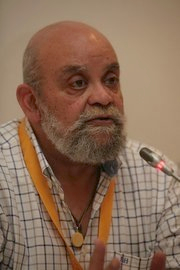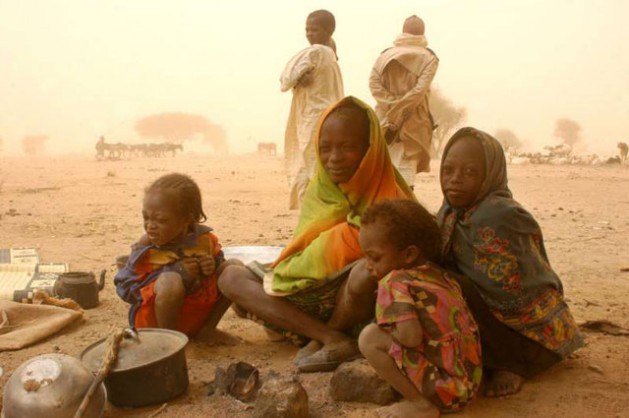By Baher Kamal*
Hardly a short, simply-worded statement could so sharply describe the ignored human drama of millions of victims of man-made wars, violence, poverty and disasters like the one spelled out by the authoritative voice of Prof. Dr. Konrad Osterwalder, the former rector of United Nations University, a global think tank and postgraduate teaching organisation headquartered in Japan.
But while widespread violence and climate catastrophes are common to all continents and countries, there is an overwhelming consensus among experts, scientific community and international specialised organisations that Africa is the most impacted region by them.
Only second to Asia, both extension and population wise, Africa is on the one hand home to nearly half of some 40 on-going armed conflicts.
On the other, this continent made of 54 states and 1,2 billion inhabitants, is the most hit region by all sorts of consequences of growing climate change—to which by the way it is the least originator.
Seven Key Facts
The cause-effect relationship between climate and massive population movement is already an indisputable fact. See what world specialised organisations say:
1. – Droughts combined with population growth, a lack of sustainable land and water management, natural disasters, political conflicts and tensions and other factors have resulted in massive population movements across Africa, the United Nations Environment Programme (UNEP) reports.
Displacement in Africa is the result of a multitude of causes including struggles for political power, communal violence, disputes over land, floods, storms and other such natural hazards, it adds. More than half of the world’s fragile states are in sub-Saharan Africa, and some of these states have the largest numbers of internally displaced persons (IDPs).
“Africa has more countries affected by displacement than any other continent or region, and was home to more than 15 million internally displaced persons in 2015.”
In short, “the relationship between displacement and the environment is well established in Africa. People leave places with slow-onset environmental degradation, such as drought and desertification and continue to flee rapid on-set environmental emergencies such as tropical storms and flash floods,” says Saidou Hamani, Regional Coordinator for Disasters and Conflict sub-programme, UNEP Regional Office for Africa.
2. – According to the 2016 Global Report on Internal Displacement, there were 27.8 million new displacements in 127 countries during 2015, roughly the equivalent of the populations of New York City, London, Paris and Cairo combined; of the total, 8.6 million were associated with conflicts and violence in 28 countries, while 19.2 million were associated with disasters in 113 countries.
The growing intensity of meteorological disasters due to climate change, coupled with the effects of environmental degradation is likely to continue being a factor behind human displacement.
The International Organization of Migration (IOM) predicts there will be 200 million environmentally-displaced people by the year 2050 with major effects on countries of origin, transit countries, as well as receiving countries.
Individuals and communities displaced by disasters and climate change and those displaced by conflicts often experience similar trauma and deprivation. They may have protection needs and vulnerabilities comparable to those whose displacement is provoked by armed violence or human rights abuses. “Climate change is expected to further exacerbate the stress that fragile states are already facing.”
“Africa has more countries affected by displacement than any other continent or region, and was home to more than 15 million internally displaced persons in 2015” – UNEP
In Africa, environmental degradation and food insecurity are related to floods and other factors such as diminishing pasture for cattle as well as water, firewood and other natural resource scarcities, says IOM.
Such factors contribute to displacement, resulting in increasing competition for scarce resources, which also contributes to armed conflict, particularly between pastoralists and sedentary communities.
Future forecasts vary from 25 million to 1 billion environmental migrants by 2050, moving either within their countries or across borders, on a permanent or temporary basis, with 200 million being the most widely cited estimate. This figure equals the current estimate of international migrants worldwide.
3. – “Changes in the regional climate are impacting issues linked to the availability of natural resources essential to livelihoods in the region, as well as food insecurity. Along with important social, economic and political factors, this can lead to migration, conflict or a combination of the two,” according to Livelihood Security Climate Change, Migration and Conflict in the Sahel.
4. – It is evident that gradual and sudden environmental changes are already resulting in substantial population movements, the UN Refugee agency (UNHCR) reports.
“The number of storms, droughts and floods has increased threefold over the last 30 years with devastating effects on vulnerable communities, particularly in the developing world.”
“Climate change and the environment have a big impact on the lives of millions of forcibly uprooted people around the world.”
Many of them rely on the environment for survival, particularly during emergencies – for food, shelter, energy, fire and warmth, medicine, agriculture, income-generation activities and more, adds UNHCR.
“Unsustainable use of natural resources can lead to environmental degradation, with lasting impacts on natural resources and on the well-being of the displaced and host communities. Additionally, competition over scarce natural resources, such as firewood, water and grazing land, can lead to friction.”
5. – Gradual changes in the environment tend to have an even greater impact on the movement of people than extreme events. For instance, over the last thirty years, twice as many people have been affected by droughts as by storms (1.6 billion compared with approx. 718m),according to the International Disaster Database.
In 2008, 20 million persons have been displaced by extreme weather events, compared to 4.6 million internally displaced by conflict and violence over the same period.
6. – Disasters and climate change are a growing concern. Since 2009, an estimated one person every second has been displaced by a disaster, with an average of 22.5 million people displaced by climate or weather-related events since 2008, according to the International Displacement Monitoring Centre www.internal-displacement.org report. (IDMC 2015).
7. – The Intergovernmental Panel on Climate Change, the UN’s science advisory board, projects an increase in the number of displaced over the course of this century. The majority of the people of concern to UNHCR are concentrated in the most vulnerable areas around the world.
Climate change will force people into increasing poverty and displacement, exacerbating the factors that lead to conflict, rendering both the humanitarian needs and responses in such situations even more complex.
Now two key related events are scheduled to take place in the coming days: Africa Drought Conference in Windhoek, Namibia, August 15-19, and the World Humanitarian Day, August 19.
Will this growing, unstoppable human drama deserve the attention of world politicians or at least of the mainstream media?
Related IPS Articles
- War on Climate Terror (I): Deserts Bury Two Thirds of African Lands
- African Farmers Can Feed the World, If Only…
- ‘Monster’ El Niño Subsides, La Niña Hitting Soon
- Climate Victims – Every Second, One Person Is Displaced by Disaster
- Climate: Africa’s Human Existence Is at Severe Risk
- Will the Middle East Become ‘Uninhabitable’?
*Baher Kamal’s report was published in IPS. Go to Original.
—
 *Baher Kamal, Egyptian-born, Spanish-national secular journalist. He is founder and publisher of Human Wrongs Watch. Kamal is a pro-peace, non-violence, human rights, coexistence defender, with more than 45 years of professional experience.
*Baher Kamal, Egyptian-born, Spanish-national secular journalist. He is founder and publisher of Human Wrongs Watch. Kamal is a pro-peace, non-violence, human rights, coexistence defender, with more than 45 years of professional experience.Baher Kamal is also Senior Advisor to the Director General of international news agency IPS on Africa and the Middle East.
More articles by Baher Kamal in Human Wrongs Watch:
War on Climate Terror (I): Deserts Bury Two Thirds of African Lands
African Farmers Can Feed the World, If Only…
Climate Victims – Every Second, One Person Is Displaced by Disaster
400 Million People Live with Hepatitis But They Do Not Know
Rights of Indigenous Peoples ‘Critical’ to Combat Climate Change
Forests: To Farm or Not to Farm? That’s the Question!
‘Monster’ El Niño Subsides, ‘Monster’ La Niña Hitting Soon
‘Modern World Is Chaotic, Confused; Human Security a Must’
Xenophobic Rhetoric, Now Socially and Politically ‘Acceptable’ ?
‘Hate Is Mainstreamed, Walls Are Back, Suspicion Kills’
What If Turkey Drops Its “Human Bomb” on Europe?
Humanitarian Aid – Business As Unusual?
World Oceans Day – A Death Sea Called Mediterranean
The Humanitarian Clock Is Ticking, The Powerful Feign Deafness
Humanitarian Summit, The Big Fiasco
Humanitarian Summit: Too Big to Fail?
Humanitarian Summit Aims to Mobilise Up to 30 Billion Dollars
Africa, Resolved to Address African Problems With African Solutions
‘We Cannot Keep Jumping from Crisis to Crisis’
‘Human Suffering Has Reached Staggering Levels’
Now 1 in 2 World’s Refugees Live in Urban Areas
Middle East – The Mother of All Humanitarian Crises
Mideast: 1 in 3 Pays Bribe to Access Basic Public Services
Climate: Africa’s Human Existence at Severe Risk
No Water in the Kingdom of the Two Seas – Nor Elsewhere
Will the Middle East Become ‘Uninhabitable’?
Can an Animal Heist Fable Help Solve the Middle East Crisis?
A “Colombian Triangle” for Daesh in Libya?
‘Take My Iraqis and Give Me Some Syrians’ – Europe to Turkey
New Nuclear Hysteria in the Middle East
Africa Launches Largest Trading Block with 620 Million Consumers
Big War Lords Playing Brinkmanship Game in Syria
Cameron at large: Want Not to Become a Terrorist? Speak Fluent English!
Women’s Rights First – African Summit
Africa, Only If It Bleeds It Leads?
Seven Top Challenges Facing African Women
Once Auctioned, What to Do with the ‘Stock’ of Syrian Refugees?
Silence, Please! A New Middle East Is in the Making
The Over-Written, Under-Reported Middle East (II): 99.5 Years of (Imposed) Solitude
The Over-Written, Under-Reported Middle East (I): Of Arabs and Muslims
Egypt in the Rear Mirror (I): The Irresistible Temptation to Analyse What One Ignores
Egypt in the Rear Mirror (II): Who Are the Not-So-Invisible Powers Behind the Troglodytes?
Fed Up With Empty Promises, The Arabs May Abandon Nuclear Non-Proliferation Treaty
Anti-Nukes Move from Norway to Bahrain
Middle East Nuclear Free Bid Moves to Finland – Yet Another Lost Chance?
Annual Spending on Nuclear Weapons, Equivalent To UN Budget For 45 Years
Watch The Sky–It May Rain Atomic Bombs
Save The Planet? Just Eat Cars, Drink Fuel!
Who Is Afraid of 300 Or 400 Or 500 Million Miserables?
Violence And Death For Millions Of Life-Givers
Whither Egypt (I) – Did You Say Dictatorship?
Whither Egypt (II) – Economic Bankruptcy
Politicians Promote Fossil Fuels with Half a Trillion Dollars a Year
Who Dares to Challenge a 32 Billion Dollars Business – Human Trafficking?
Palestine: Yet Another One Hundred Years of Solitude
Does Anyone Know Anything About A New Country Called South Sudan?
South Sudan: Yet Another Kitchen-Garden?
Somalia? Which Somalia? Some Facts About Everybody’s — Nobody’s Land
2016 Human Wrongs Watch












